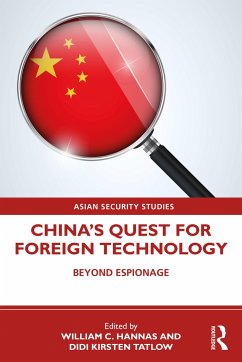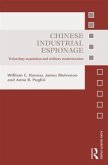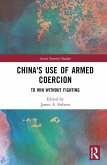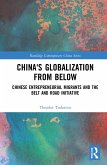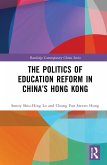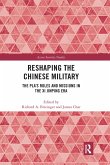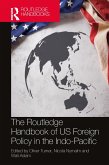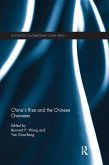This book analyzes China's foreign technology acquisition activity and how this has helped its rapid rise to superpower status.
Since 1949, China has operated a vast and unique system of foreign technology spotting and transfer aimed at accelerating civilian and military development, reducing the cost of basic research, and shoring up its power domestically and abroad-without running the political risks borne by liberal societies as a basis for their creative developments. While discounted in some circles as derivative and consigned to perpetual catch-up mode, China's "hybrid" system of legal, illegal, and extralegal import of foreign technology, combined with its indigenous efforts, is, the authors believe, enormously effective and must be taken seriously. Accordingly, in this volume, 17 international specialists combine their scholarship to portray the system's structure and functioning in heretofore unseen detail, using primary Chinese sources to demonstrate the perniciousness of the problem in a manner not likely to be controverted. The book concludes with a series of recommendations culled from the authors' interactions with experts worldwide.
This book will be of much interest to students of Chinese politics, US foreign policy, intelligence studies, science and technology studies, and International Relations in general.
Since 1949, China has operated a vast and unique system of foreign technology spotting and transfer aimed at accelerating civilian and military development, reducing the cost of basic research, and shoring up its power domestically and abroad-without running the political risks borne by liberal societies as a basis for their creative developments. While discounted in some circles as derivative and consigned to perpetual catch-up mode, China's "hybrid" system of legal, illegal, and extralegal import of foreign technology, combined with its indigenous efforts, is, the authors believe, enormously effective and must be taken seriously. Accordingly, in this volume, 17 international specialists combine their scholarship to portray the system's structure and functioning in heretofore unseen detail, using primary Chinese sources to demonstrate the perniciousness of the problem in a manner not likely to be controverted. The book concludes with a series of recommendations culled from the authors' interactions with experts worldwide.
This book will be of much interest to students of Chinese politics, US foreign policy, intelligence studies, science and technology studies, and International Relations in general.
"In today's contested world, it is vitally important for decision makers and researchers to have access to unfettered, apolitical analyses of otherwise highly politicized subjects. This book does that. It provides an insightful description of the nexus between technology and sovereignty, and undistorted analytical advice on issues that will reshape the global order in years to come."-- Daniel P. Bagge is Cyber Attaché of the Czech Republic to the United States.
"China is engaged in the most systematic, well-funded and comprehensive technology transfer strategy in history. There is no more important topic with implications for U.S. national security. This collection of expert perspectives is a must-read to place the current technology race with China in context."--Michael Brown is Co-Author of the DIUx Report and former Presidential Innovation Fellow.
"This volume is an essential handbook for everyone from the lay reader to public leaders. It brings together an incredible group of talent to break down this highly complex and misunderstood area. This is precisely the type of thoughtful engagement and research needed right now on this critical topic"--Kathleen Claussen is Associate Professor at the University of Miami School of Law, USA.
"Seventeen experts of the mechanisms and political motives behind the Chinese Communist Party's legal, illegal and grayzone technology transfer efforts present a profound analysis of the system's structure, mode of operation, scale, and its consequences for liberal open societies worldwide. Forcefully and convincingly, the book makes a strong argument that confronted with this particular challenge for global leadership, ignorance is harmful and remedying the situation is urgent."-- Volker Stanzel is a scholar at the German Institute for International and Security Affairs, and former German ambassador to China and Japan.
"The intentions and practices of the Chinese Communist Party are perhaps the most important things for policymakers and the general public to understand in today's world. 'Beyond Espionage' provides excellent insight into these issues and should be required reading for anyone involved with technology policy, economic policy or national security."-- Mathew Turpin is former Director for China, U.S. National Security Council
"With meticulous research Bill and his fellow authors have made a sobering case for us to deal with the reality of China's technology practices instead of seeing the kind of partner we wished or wish it to be. Whatever path we take forward from here, our chances of finding a reasonable outcome will be greatly improved if we ground our policies in the clear eyed view and understanding this work provides."--Stephanie O'Sullivan, former head of CIA's Directorate of Science and Technology, Associate Deputy Director of CIA, and Principal Deputy Director of National Intelligence, ODNI
"China is engaged in the most systematic, well-funded and comprehensive technology transfer strategy in history. There is no more important topic with implications for U.S. national security. This collection of expert perspectives is a must-read to place the current technology race with China in context."--Michael Brown is Co-Author of the DIUx Report and former Presidential Innovation Fellow.
"This volume is an essential handbook for everyone from the lay reader to public leaders. It brings together an incredible group of talent to break down this highly complex and misunderstood area. This is precisely the type of thoughtful engagement and research needed right now on this critical topic"--Kathleen Claussen is Associate Professor at the University of Miami School of Law, USA.
"Seventeen experts of the mechanisms and political motives behind the Chinese Communist Party's legal, illegal and grayzone technology transfer efforts present a profound analysis of the system's structure, mode of operation, scale, and its consequences for liberal open societies worldwide. Forcefully and convincingly, the book makes a strong argument that confronted with this particular challenge for global leadership, ignorance is harmful and remedying the situation is urgent."-- Volker Stanzel is a scholar at the German Institute for International and Security Affairs, and former German ambassador to China and Japan.
"The intentions and practices of the Chinese Communist Party are perhaps the most important things for policymakers and the general public to understand in today's world. 'Beyond Espionage' provides excellent insight into these issues and should be required reading for anyone involved with technology policy, economic policy or national security."-- Mathew Turpin is former Director for China, U.S. National Security Council
"With meticulous research Bill and his fellow authors have made a sobering case for us to deal with the reality of China's technology practices instead of seeing the kind of partner we wished or wish it to be. Whatever path we take forward from here, our chances of finding a reasonable outcome will be greatly improved if we ground our policies in the clear eyed view and understanding this work provides."--Stephanie O'Sullivan, former head of CIA's Directorate of Science and Technology, Associate Deputy Director of CIA, and Principal Deputy Director of National Intelligence, ODNI

